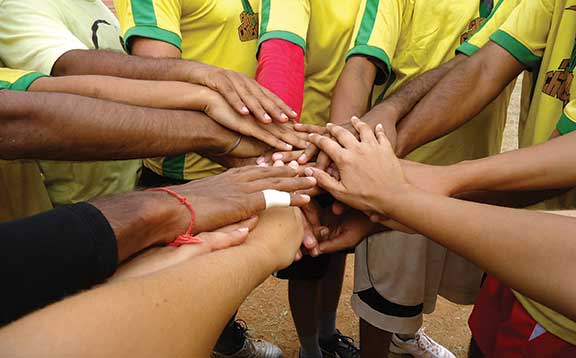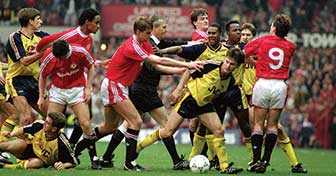Dhruva Desai
In a game of football in school a few weeks ago, H and S, long-term best friends, were on opposite teams. At some point during the game, amidst a constant stream of back and forth banter between members of both teams, S shouted loudly to his teammates ‘don’t worry about H – he’ll never be able to catch up’. Reacting to the laughs this got, he added ‘I’ve known him since he was 5, he still doesn’t know how to kick a ball!’ A few days later, several students and a teacher had to break up a fight between the two, and in the aftermath S was mystified. “I don’t know what’s wrong with him – I’ve been asking [H] for days why he isn’t talking to me and today he just hit me.”
There’s a lot to unpack in the above story – the lack of communication between the two boys after the game, the culture of the school that allowed this sort of banter to be so common, the gendered notions inherent in the banter and much more besides. I’d like to focus on why S felt the need to belittle H – a close personal friend – in the first place.
Social Identity Theory, developed by Tajfel and Turner in the late 1970s, states in part that individuals are looking to enhance their self-esteem. This is tied into the fact that individuals also, to different extents, identify with certain groups. Our self-esteem, or self-image is tied into the image of the group, and we look for ways to enhance that group image relative to other groups [this is, of course, a highly pared down description of their theory]. In the example above, S was participating in a process of banter [as were all the other players] that was designed to make their team seem better in large part by belittling the other team.

https://rosethomson.wordpress.com/tag/spirit-circles/
In a primary school I work with, which has worked for many years to foster an ethos of care for each other and the environment, I regularly see young children – often close friends – mocking each other when a mistake is made by someone on the opposing team. These are not values being modelled by any of the adults around them. The simple fact of being on opposite teams seems to make us wish harm/misfortune on the other person. This reflects another of Tajfel’s theory’s central tenets – simply being defined as a group causes us to display in-group [the group we are part of] favouritism, and out-group discrimination.
When a group of our students at another school organized a frisbee tournament for themselves with some teams from a different city, as a teacher/adult body we were extremely proud of the initiative they had shown. Frisbee had been something of a game-changer [pun intended] in that space, helping many students come out of their shells, encouraging children of all genders to play together, and creating a real strong sense of being part of a group among students who had struggled to coexist peacefully up until then.
In the tournament, we saw remarkable examples of sensitivity from students on the school team – helping each other out and making sure to be inclusive. Unfortunately, the school team lost in a competitive final. Almost immediately, the same students who had surprised us with their sensitivity were shocking us equally with their rage. All the well thought out words and platitudes about participation being important, about being in it so that everyone has a good time together applied, it seemed, only to their own team, and only when they were winning. Students spent the next week in an angry/depressed funk, bemoaning the ‘cheating’ of the other teams, the ‘favouritism’ the adults had shown against the school team, and so on. None of this was in evidence to any of the adults from either city, and expressing that only made the feeling of being hard done by more concrete. As they felt the world was turning against them, they retreated more tightly into their own group. Their ‘in-group’ was under threat and each individual felt the need to defend it – an extension of their own self-image.
We see versions of this behaviour in ourselves and our friends and family every time the Indian national [men’s] team is playing a cricket match. The team becomes an extension of our identity. We take failure as a personal shame [after the team’s recent humbling loss to Pakistan, in the T20 world cup, I overheard a neighbour bitterly complaining about how he felt less of a man that day], and we take perceived threats in the realm of sport far beyond sport. We feel the need to revel in on-field slanging [if ‘our team’ is the ‘winner’ of the slanging], and sharing memes about the laughable characteristics of the other nation and its people.
Does this closeness of the in-group [which, in the case of the frisbee team up until this tournament we hadn’t seen as an in-group at all] have to come at the cost of any potential friendship with the other team? That is to say, can the frisbee team only be close as long as they have another team to call an enemy? Can we only be proud of ‘team India’ as long as we are simultaneously disparaging ‘team Australia’?
Sport and games are not divorced from the context of the world we live in – sports teams, both in formation and support patterns, reflect pre-existing biases and serve to further them. When we leave students to pick their own teams on a regular basis, we frequently find the same students getting left out and those rejections mirror societal ones – whether due to caste, gender identity or any other reason.

https://www.planetfootball.com/quick-reads
As a person who has played and enjoyed sports my whole life, I’ve always held up ‘sport’ as an ideal in schools and in classrooms since I’ve become a teacher. I have argued for making games or PE classes as regular in students’ timetables as math or language. I have always given in to students who have requested extra time to play, invariably joining them on the field. While I have always noted the conflicts that sport – especially organized sport – engender, it has been easy to ignore them, or attempt to deal with them in other ways or moralize about ‘teamwork’, ‘focus’ and ‘discipline’ in a seemingly related, but actually parallel response.
It’s in the last few months, while I have been engaged in research on prejudice and stereotyping, that I’ve really been taking another look at the sports and games I hold so dear both in my life and in my teaching practice. The long-term effects of these habits – the jingoism and hatred that sports teaches us can have some serious impacts. As we saw in the case of S and H, the conflict doesn’t always remain on the field. As our experience with our frisbee playing students showed us, organized sport can reinforce a lot of the worst aspects of group behaviour – that friendship/team membership comes at the cost of ‘defeating’ the ‘others’. Those are values completely inconsistent with the rest of my teaching practice.
This is not to say that sports are all absolutely bad and that we should immediately stop teaching it in every form. Traditional sports can be taught and played with greater sensitivity, we can combine the physical aspects of the game with discussions about behaviour and team membership. Post-game debriefs and reflection can and should be as essential an aspect of the sport as the scoring of goals. Ultimate [generally referred to as Ultimate Frisbee], the disc-based team sport [perhaps practiced differently from the way we handled the tournament mentioned above], has worked this into its structure already in some ways – the sport is self-refereed by a set of rules called the spirit of the game. In several tournaments across the world, built into the tournament structure are post-game circles where both teams mix and discuss the game, as well as play less competitive fun games as mixed groups – reminding the players that the point was to enjoy the sport, not compete with each other. Similarly, individual sports and athletics where the primary challenge is against the environment, or ‘course’, such as rock climbing, long distance running and so on, can develop groups of individuals who support each other and work together to overcome individual obstacles.
There are also, at different age groups, different games and sports which encourage collaboration rather than competition. An entire group has to work together to solve challenges [etc.], and each individual succeeds only when the group succeeds. These activities can foster a sense of togetherness and teamwork, without simultaneously developing anus-vs-them mentality linked to ‘success’. There are variations of traditional sports which encourage similar behaviours – football where a goal can’t be scored without every player on the field having had two touches for instance [and none having had more than 3].
Whatever our approach practically, it should be guided by the same critical philosophy that guides the teaching of, say, social science or encourages us to apply the scientific method. Critical pedagogy needn’t stop outside on the playground. In an aspect of life that every child engages with, and certainly most schools do – play – we need to ask ourselves what we are really teaching in those moments.
Sport sociologists Eric Anderson and Adam White have written in their book, Sport, Theory, and Social Problems that “just because sport is highly esteemed, it does not necessarily mean that it is actually “all good” or even mostly good. In many cases, sport is perfectly awful.” While we may or may not agree with the severity of their condemnation, it seems clear to me that something needs to change, and an important starting point for that change needs to be in the way we teach sports in schools.
References
• Anderson, E. (2017). Sport, theory and social problems: A critical introduction (Second edition). Routledge, Taylor & Francis Group.
• Dovidio, J. F., Glick, P. S., & Rudman, L. A. (Eds.). (2005). On the nature of prejudice: Fifty years after Allport. Blackwell Pub.
• Fiske, S. T. (2005). Social Cognition and the Normality of Prejudgement. In On the nature of prejudice: Fifty years after Allport (pp. 36–53). Blackwell Pub.
• Freire, P., 1921-1997. (2000). Pedagogy of the oppressed. Thirtieth anniversary edition. New York : Continuum.
• Tajfel, H., Turner, J. C., Worchel, S., & Austin, W. G. (1979). An integrative theory of inter-group conflict. In The Social Psychology of Inter-group Relations (pp. 33-47). Brooks/Cole.
The author is an educator, currently based in Himachal. Along with playing various games and reading books with students of different ages, he’s currently working on a research project at Azim Premji University, as part of an Interest Group for Compassion, Dialogue, and Justice. He can be reached at dhruva.desai13@apu.edu.in.
